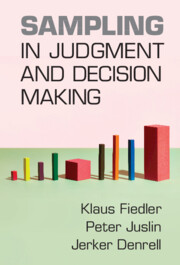
-
Select format
-
- Publisher:
- Cambridge University Press
- Publication date:
- 01 June 2023
- 15 June 2023
- ISBN:
- 9781009002042
- 9781316518656
- 9781009009867
- Dimensions:
- (229 x 152 mm)
- Weight & Pages:
- 0.98kg, 572 Pages
- Dimensions:
- (229 x 152 mm)
- Weight & Pages:
- 0.81kg, 572 Pages
You may already have access via personal or institutional login
Book description
Sampling approaches to judgment and decision making are distinct from traditional accounts in psychology and neuroscience. While these traditional accounts focus on limitations of the human mind as a major source of bounded rationality, the sampling approach originates in a broader cognitive-ecological perspective. It starts from the fundamental assumption that in order to understand intra-psychic cognitive processes one first has to understand the distributions of, and the biases built into, the environmental information that provides input to all cognitive processes. Both the biases and restriction, but also the assets and capacities, of the human mind often reflect, to a considerable degree, the irrational and rational features of the information environment and its manifestations in the literature, the Internet, and collective memory. Sampling approaches to judgment and decision making constitute a prime example of theory-driven research that promises to help behavioral scientists cope with the challenges of replicability and practical usefulness.
Reviews
‘Inferences depend heavily on what information is sampled. With chapters by leading sampling researchers, this book provides a fascinating overview of the innovative work done on this topic over recent decades. Sample these chapters to gain insights into how our minds work.’
Robin Hogarth - Barcelona School of Economics and Universitat Pompeu Fabra, Spain
‘There has been a revolution in cognitive and social psychology. The conventional view on rationality, which locates the causes of poor choices and judgments in the human mind, is being replaced with the view that the properties of informational samples go a long way to explain the successes and the failures of rational and irrational thinkers alike. A massive fundamental attribution error, committed by psychological science, is thus being corrected. This masterly volume, edited by Fiedler, Juslin, and Denrell, is a progress report and a manifesto of hard-nosed scientific progress.’
Joachim I. Krueger - Brown University, USA
‘This book makes a compelling case that we can greatly enrich our understanding of human judgment and decision making if we focus on how we sample information from environments that often seem deliberately designed to confuse or mislead us.’
Barbara Mellers - University of Pennsylvania, USA
Contents
Metrics
Altmetric attention score
Full text views
Full text views help Loading metrics...
Loading metrics...
* Views captured on Cambridge Core between #date#. This data will be updated every 24 hours.
Usage data cannot currently be displayed.
Accessibility standard: Unknown
Why this information is here
This section outlines the accessibility features of this content - including support for screen readers, full keyboard navigation and high-contrast display options. This may not be relevant for you.
Accessibility Information
Accessibility compliance for the HTML of this book is currently unknown and may be updated in the future.


